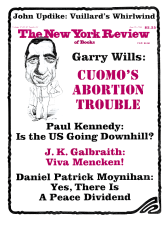In response to:
The Decline and Fall of the French Revolution from the February 15, 1990 issue
To the Editors:
Conor Cruise O’Brien’s remarks on Rousseau’s political theory and its influence, in his well-informed and immensely stimulating review-essay on A Critical Dictionary of the French Revolution [NYR, February 15], are exactly on the mark. His condemnation of the Declaration of the Rights of Man and the Citizen, however, seems to me to call for some modification.
It is limited to Article 3 (“The source of all sovereignty resides essentially in the nation: no group, no individual may exercise authority not emanating expressly therefrom”) and to the “general will” idea in Article 6. Now the meaning of any proposition may be approached in one of two ways. One way is to probe its writer’s intention. This way is generally open to uncertainty; but in this case—and Mr. O’Brien himself makes the point about Sieyès—the intention was antithetical to its outcome in a later phase of the Revolution and Sieyès was appalled by it. The other way is to follow Charles Peirce’s opinion that the meaning of a proposition consists of its possible deductions and consequences.
In 1792–1794 the consequences of Rousseau’s theory of the general will and of Article 3 were exactly those described by Mr. O’Brien. On the other hand, the later—and indeed the immediate reading—corresponded not to the Rousseau-type deductions from it by Robespierre and Saint-Just, but rather to the original intent, which was to prevent recurrence of the tyranny of the Ancien Régime. The tyranny of the general will was not part of this context; the phrase was almost surely taken in a majoritarian sense (cf. the American antecedents which Mr. O’Brien emphasizes and which were familiar to Sieyès and others), not in Rousseau’s absolutist, unanimous sense (how obtain unanimity in an elected parliament?).
Thus the influence of the Declaration on later generations was what was intended by the title, a declaration of political and human rights. It permeates the document as a whole, and one cannot exclude the whole in favor of the part. The influence of the Declaration should not be confused with Rousseau’s influence, which (as is pointed out) went in the opposite direction for the most part. That the writers of the Declaration were influenced by American events and documents is irrelevant to the point of its influence, but quite relevant to their intent.
Castro and Mao read the Social Contract. I don’t know whether they read the Declaration, but we can guess how they read it, if they did.
Lester G. Crocker
New York City
Conor Cruise O’Brien replies:
I am very glad to have Professor Crocker’s endorsement of my assessment of Rousseau’s political theory and its influence. I accept his correction concerning the intent—as distinct from the consequences—of the Declaration. I didn’t exactly mean my remarks as a condemnation of the Declaration. I meant that its liberating effect was being exaggerated in the euphoria of the Bicentennial. Also that the “general will” Articles meant that it gave no protection to accused persons under the Terror.
This Issue
June 28, 1990



